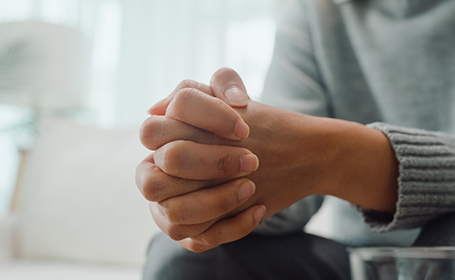
The link between chronic pain and depression
Living with chronic pain isn't easy. It's not only painful, but it can be incredibly draining and even debilitating to your mental health. However, the effects of living in pain are often overlooked and underestimated
We all experience pain throughout our lives, from cutting a finger to spraining an ankle. But chronic pain is something else entirely. It's persistent, it doesn't go away and it can wreak havoc on your mental well-being.
In fact, around 20% of people worldwide are affected by chronic pain. But is there really a link between chronic pain and depression?
One study found that 60.8% of people with chronic pain had severe depression.
Are chronic pain and depression connected?
Chronic pain and depression commonly co-exist; pain can be a result of persistent depression and depression can be a result of persistent pain.
Did you know that pain is considered chronic if it lasts for more than 3-6 months?
One study found that 60.8% of people with chronic pain had severe depression. These patients also had a greater number of absences from work and were more likely to not work at all due to their ill health.
It's also not uncommon to experience anxiety alongside chronic pain. Anxiety disorders are the second most diagnosed disorder after depression in those with chronic pain.
Find out about anxiety and how to cope with it
Some people may find that their pain and mental health issues cause them to avoid certain situations and become inactive.
Both of these behaviours can become chronic issues in themselves. Avoidance can lead to social isolation, and inactivity can worsen chronic pain. In turn, this can make depression even worse.
Here are conditions that can cause chronic pain:
Chronic pain can be caused by many different conditions or illnesses. Some of the most common causes include:
- Endometriosis
- Past injuries or surgeries
- Back problems
- Arthritis
- Nerve damage
- Fibromyalgia
- Migraines
- Cancer pain
- Slow healing after surgery
Depression and surgery
Not only can depression make day-to-day life difficult, but it can also slow down the healing process after surgery and lead to further complications.
A study on patients undergoing knee replacement, hip replacement and varicose vein surgeries, found that those with moderate anxiety and depression had an increased chance of wound complications, hospital re-admissions and longer hospital stays. The complications were even worse for those with severe anxiety or depression.
Mental health is something that shouldn't be overlooked before having surgery. If you think you might be depressed and are going to have surgery, it's important to seek help to make sure you're physically and mentally prepared.

10 signs you might be depressed:
Symptoms vary from person to person and can include physiological, physical and social symptoms. There are many different symptoms of depression, but they can include:
- Loss of interest in things you used to enjoy
- Persistent low mood
- Feeling hopeless
- Feeling anxious
- Having low self-esteem
- Lack of energy
- Isolating yourself from friends and family
- Feeling irritable and intolerant of others
- Experiencing suicidal thoughts or thoughts about harming yourself8
How to treat chronic pain
If you're suffering from chronic pain and depression, it's important to treat both problems at the same time. Considering one without the other isn't likely to resolve the overall issue. However, when the two occur simultaneously, it can be harder to treat.
Chronic pain can be treated in a number of ways. Everyone is different and what works for someone else may not work for you. However, chronic pain can be managed with the aim of going back to everyday life.
Some ways chronic pain can be managed are:
- Medication
- Acupuncture
- Massage therapy
- Reflexology
- Yoga
- Pilates
- Pain management
- Physiotherapy
- Surgery (depending on the condition)
Learn more about pain management
How to treat depression
If left untreated, depression can have serious health effects. Not dealing with depression can lead to an increased chance of engaging in risky behaviours, such as alcohol addiction or drug use.
Those with a mental health condition are also at a higher risk of suicide. More than 90% of suicides and attempted suicides have been related to a psychiatric disorder. The highest rates were linked to depression.
There are various treatment options for depression and it's really important to not delay getting help.
How to recognise the signs of depression
Treatment options for depression include:
- Psychiatry - this can help you to manage the psychological and emotional effects of mental illness
- Cognitive Behaviour Therapy (CBT) - a talking therapy based on how your thoughts beliefs and attitude affect your feelings and behaviour
- Meditation - this can help you to rebalance your thoughts
- Medication - antidepressants and other medications are a treatment choice, but should be discussed with you and your doctor
- Exercise - vigorous exercise release endorphins which can make you feel happier and boost your mood
What to do next?
When it comes to depression and chronic pain, it's clear that there is a need for action and a greater understanding of how these conditions are interlinked. Both conditions should be treated at the same time to ensure the most positive outcomes and most effective management.
If you think you might be depressed, it's important to speak up and seek help. Charities such as Mind and The Samaritans can offer support and advice if you need it. You can also find out more about Cognitive Behaviour Therapy (CBT).
Advances in our understanding of chronic pain over the last 10-20 years have ushered in personalised pain management to the benefit of patients who previously felt ignored.
A Consultant's View
Consultant in Pain Medicine & Neuromodulation, Dr Norman Kufakwaro, sheds light on the connection between chronic pain and depression.
How are depression and chronic pain linked?
Dr Norman Kufakwaro says...
"It's a well-known phenomenon that people exposed to stressful life events may develop depression. It has been proven that a high concentration of stress hormones induces significant change of receptors in our bodies which are closely linked with pain, anxiety and depression. Depression can be triggered or precipitated by chronic pain. As a result, individuals with chronic pain are at a high risk of long lasting emotional disturbances characterised by persistent low mood and anxiety.
"The relationship between chronic pain and depression can also be looked at as chicken and egg. Individuals with depression are predisposed to developing chronic pain. There is evidence that supports both views. Patients with pre-existing depression are more likely to develop headaches and chest pain. Conversely several studies support the notion that depression is a consequence of chronic pain.
"On balance, recent evidence now supports that depression is a consequence of chronic pain rather than the other way round. The changes induced in our bodies by both conditions can explain this conundrum as they share the same chemical mediators, namely noradrenaline and serotonin. Hence antidepressants are recommended by NICE (The National Institute for Health and Care Excellence) and are commonly used as first line treatment of chronic pain. Many clinicians support the use of early and effective painkillers to treat various chronic pain conditions, which can reduce the risk of developing affective disorders.
"Nevertheless, the emotional consequence of chronic pain takes a while to develop. This is a result of slow changes to one's nervous system. Once this occurs, it can be compared to a miswired computer or a misfiring system which has a considerable impact on the individuals' quality of life.
"In summary, there is a recognised link between depression and chronic pain. We are also aware that chronic pain can be associated with anxiety and cognitive decline in the long term. Given the relationship between chronic pain and depression, the treatment of chronic pain follows a multi-disciplinary team management approach which is widely used all over the world. In addition to this, advances in our understanding of chronic pain over the last 10-20 years have ushered in personalised pain management to the benefit of patients who previously felt ignored and isolated by family, friends and clinicians with poor understanding of their condition."
If you would like to speak to a professional about chronic pain and depression, book a consultation with one of our consultants online today.
Tags
How do I book an appointment?
If you're concerned about symptoms you're experiencing or require further information on this subject, talk to a GP or see an expert consultant at your local Circle Hospital.